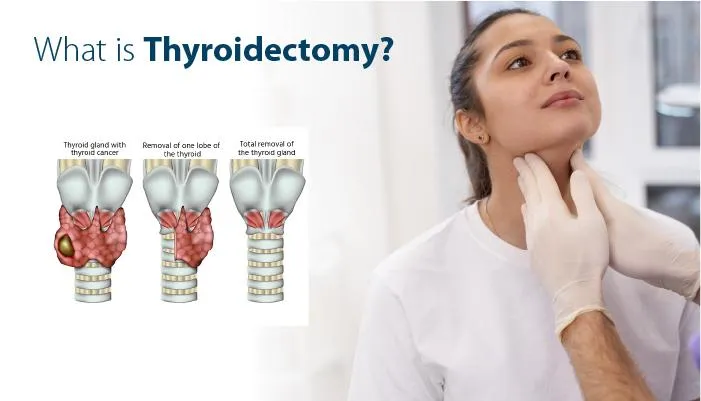Thyroidectomy Surgery
July 27, 2024
What is Thyroidectomy?
Thyroidectomy is a surgical method to remove a part or the entire thyroid gland. The thyroid is a butterfly-shaped or H-shaped gland found at the base of the neck, below the Adam's apple. This gland produces hormones that are critical for regulating metabolism, heart rate, body temperature, and other vital functions. When the thyroid gland becomes diseased or dysfunctional, thyroidectomy may be necessary to reduce symptoms, restore overall health, and prevent complications.
Why is It Done?
There are several reasons why a thyroidectomy is recommended:
- Thyroid Cancer: If a cancerous tumor is found in the thyroid gland, a thyroidectomy is typically performed as the first line of treatment. In this procedure, the surgeon removes the malignant tissue and prevents the spread of cancer.
- Benign Thyroid Nodules: Non-cancerous growths in the thyroid gland, called nodules, can cause symptoms such as difficulty swallowing, hoarseness, or a visible lump in the neck. If these nodules are large or causing discomfort, a thyroidectomy may be necessary to remove them.
- Goiter: When the thyroid gland becomes enlarged, goiter can occur. This can cause cosmetic concerns, difficulty swallowing, or breathing problems. If the goiter does not respond to medication or is causing significant symptoms, a thyroidectomy may be recommended.
- Hyperthyroidism: When the thyroid gland becomes overly active, hyperthyroidism results. This condition can cause rapid heartbeat, weight loss, and anxiety. If medication and other treatments are ineffective in controlling hyperthyroidism, a thyroidectomy will be performed to remove the overactive thyroid tissue.
- Graves' disease: It is an autoimmune disorder that can result in hyperthyroidism. Graves' disease can sometimes be treated with a thyroidectomy if other therapies turn out to be unsuccessful.
Types of Thyroidectomy
There are several types of thyroidectomy procedures categorized depending parts of the thyroid gland to be removed:
- Total Thyroidectomy: In this process, the entire thyroid gland is removed, along with any associated lymph nodes, if cancer is suspected. This procedure is typically recommended for thyroid cancer, large goiters, or severe hyperthyroidism.
- Subtotal or Partial Thyroidectomy: Only a portion of the thyroid gland is removed, while some healthy thyroid tissue is left in place. This procedure may be recommended for benign nodules or small goiters.
- Thyroid Lobectomy: One of the two lobes of the thyroid gland is removed, along with the isthmus (the tissue connecting the two lobes). This procedure is typically performed for small, isolated thyroid nodules or follicular tumors.
Procedure Details
Thyroidectomy is typically performed under general anesthesia and takes between two to four hours, based on the complexity of the surgery. The key steps involved in thyroidectomy are:
- Incision: The surgeon makes a small horizontal incision in the lower neck, just above the collarbone.
- Thyroid exposure: The muscles and tissues are gently separated to expose the thyroid gland.
- Thyroid removal: Depending on the type of thyroidectomy, the surgeon carefully removes part or all of the thyroid gland, taking care to preserve the nearby parathyroid glands and recurrent laryngeal nerves, which control voice function.
- Lymph node removal (if necessary): If thyroid cancer is suspected, the surgeon may also remove nearby lymph nodes for biopsy.
- Closure: Once the entire thyroid gland or its part has been removed, the incision will be closed with sutures or surgical adhesive. A small drain is also placed within the same area to prevent fluid accumulation.
After the surgery, patients are critically monitored in the recovery room for several hours. Your surgeon will instruct you on post-operative care for thyroidectomy, such as pain management, wound care, and any necessary medications or supplements.
Cost
The cost of thyroidectomy depends on the type of procedure, the complexity of the case, and the location of the hospital. In India, the average cost of a thyroidectomy ranges from Rs. 80,000 to Rs. 2,00,000. However, this is just a general estimate, and the actual cost will be higher or lower.
At Apollo Spectra, our team of highly skilled endocrine surgeons has extensive experience performing thyroidectomy surgery for patients with various thyroid disorders. We use advanced technology and techniques to achieve the best possible outcomes for our patients, with a focus on minimally invasive approaches, personalized care, and compassionate support throughout the treatment. Contact our general surgery department if you wish to get expert advice on thyriodectomy.
Yes, thyroidectomy is considered a major surgery, as it involves the removal of an essential endocrine gland. However, with advancements in surgical techniques and perioperative care, most patients experience a safe and successful outcome with minimal complications.
Most patients can return to work or school within 1 to 2 weeks after thyroidectomy, although a full recovery may take several weeks or months. During this time, it's essential to follow your surgeon's instructions for wound care, physical activity, and any necessary medications or supplements.
If your entire thyroid gland is removed (total thyroidectomy), you will have to take lifelong thyroid hormone replacement medication to regulate your body's metabolism and other functions. If only a portion of your thyroid is removed (subtotal or partial thyroidectomy), you may or may not require thyroid hormone replacement, which depends on the function of the remaining thyroid tissue.
The most common risks associated with Thyroidectomy are: Bleeding Infection Hoarseness or voice changes (due to recurrent laryngeal nerve injury) Hypocalcemia (low calcium levels due to parathyroid gland damage) Hypothyroidism (underactive thyroid) Scarring However, these risks are relatively low, and most patients experience a successful outcome with proper care and follow-up.
Thyroidectomy surgery typically results in a small, horizontal scar in the lower neck, just above the collarbone. However, with modern surgical techniques and careful closure, the scar is usually well-hidden and fades over time. Most patients find the scar to be a small price to pay for the relief of their thyroid symptoms and the prevention of potential complications.
NOTICE BOARD
CONTACT US
CONTACT US
 Book Appointment
Book Appointment


.svg)
.svg)
.svg)
.svg)








